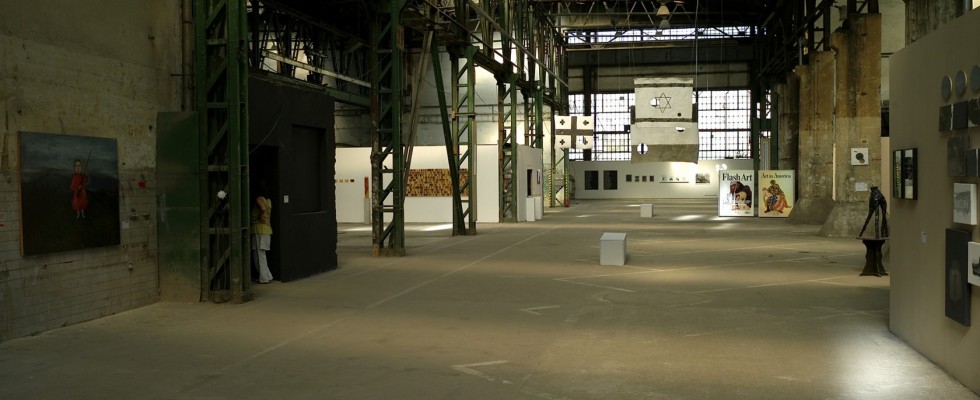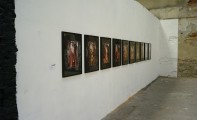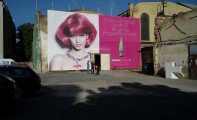Wo-man power
An imaginary row of women and an imaginary row of men as witnesses to the moment of human and posthumous being. Feminism is existential. Every artist of this type is distinctive and irreplaceable. Expressive or introvert and self-contained, a collective spirit or strictly private. A kind of humanitarian symbiosis runs through the work of certain artists who by their work long ago crossed the boundaries of the lands that they come from.
Societies objecting to nonsensical dictates, calling for freedom and independence, protesting against violence and the abuse of power. A passage that expresses a longing for the world where every individual has the right to develop its own personality.
The contemporary visual arts, including video, photography, painting and sculpture in their quality and interest act in a large way as testimony to the feminist artistic movement which originated at the beginning of the Seventies.
The development of the feverish activism of those years has had a lasting impact, which we can still see in today’s global world. The geographical origin of this art, i.e. the western part of our world view, long ago lost its exclusive meaning. Feminist tendencies have now expanded strongly to countries of the east and have taken on a new political import, in many cases dangerous for the artist itself. Women in countries which still live in conflict or where religiousness has turned into fanaticism, are seeking their identity and their self-consciousness takes shape and tend to be defined in a more elementary way than it does in more stable political systems.
Sigalit Landau, born in Jerusalem, is one of the most successful artists in Israel. Her art lies in pain, in exaltation, in suffering and in grace, in naturalism and in the chaos of the modern and a masterfully controlled dualism. She herself demands of her work: “No sentimentality”. Her installations and other work are critical. The past and the present merge together. Mortal sins and global conflicts often play a role. As do borders, identification and alienation. Extreme means of expression are typical. Her art is an embodiment, or better said an incarnation, of the structures of human existence. Sigalit directs her body like a compass seeking a lost path in an internal animal or poetic way. She seeks the balance in many forms, spiritual, philosophical, naturalist or symbolic. Sigalit Landau conceives her perception of the world multi-dimensionally. The external and internal world, the past and future as one whole.
Maja Bajevic, born in Sarajevo, comes from a country noted for its victims and fascism, from a country of religious intolerance. Her clear and strident critique of political dictatorship and the right to reveal injustices and crimes against humanity permeate all her work. In her videos, performances and installations she constantly confronts and connects the private with the public, intimacy with politics. The main theme remains the revelation of truth, the abuse of power, the perversions of fanatic religions and the marginalisation of the individual to the peripheries of society. In Maji Bajevic’s work we find a whole spectrum: a reality which is diametrically different to the reality of institutions, the diktat and governing hierarchies and religious intolerances, the collective identity and fate, the right of the individual and group to re-evaluate existing or experienced values. The tragedy of aggressive ideals and mechanisms, woman as a witness to these fateful constellations.
In the West the feminist movement has in a certain sense pluralized. Here not only women openly define their sexuality but also men are beginning to seek their identity, and not only in relation to emancipated women. The legalisation of homosexuality, lesbian relations and trans-sexuality lays bare and suggests male vulnerability and thus opens up a view into male identity.
Ulrike Rosenbach has been one of the most important personalities in media art in Germany and the world since the beginning of the Seventies. She founded the “School of creative feminism”. This pupil of Joseph Beuys has occupied a leading position in feminist art. Her untiring critique of the commonly traded picture of women is one of the main themes of her work. All the clichés of gender difference and the division of roles between men and women are tirelessly dealt with in her innumerable action performances. In doing so she reminds us that life is multi-layered and interdisciplinary. She draws attention to the fact that one of the roles of art is to point to problems which tomorrow will seem completely different. Ulrike Rosenbach emphasises complex life circumstances which are often collectively suppressed. Together with her colleagues of her time she defined new aspects of feminist art and today still gives space to questions about fundamental values for the future and mainly for contemplation. She confronts prejudices courageously and self-confidently through performance. She ignores referring to herself, does not display the beauty of the exhibited body, but creates a sort of autonomous world unchained from reality, a kind of private dance in a self-contained space. She follows a timeless path hand in hand with the past where we sense the cradle of all femininity.
Wo-man power is represented by a single man, Daniel Pešta, who always approaches the image of the woman from a feminist perspective. He’s able to enter her naturalness and energy, and in so doing woman as an object elides and transforms into a being who in an imaginary space is subject to different laws and thereby acquires a universal sensuality. Pešta crosses the borders of the polarity between the sexes and without losing his own identity accepts joint responsibility for parenthood, motherhood and fatherhood. In so doing he intentionally inhales female energy so that in a Taoist model he can wait and understand the processes which polarise the sexes, and capture them in their very beginning.
In other works he carefully and with mathematical precision gathers lived evidence and testimonies to life situations, political and social misdemeanours or feelings. No-one is either judge or accuser, matters speak for themselves, they don’t moralise or give evidence. Absolute quiet conserved in a sort of materialised document, which fascinates like a diary of something already lived or anticipated.












